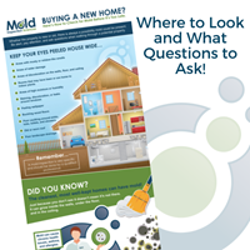Mold Inspections: Before You Buy a Home
Picture this. You just moved into your brand-new dream home – open concept, great views – and amid unpacking you discover the horror that is mold, or what seems to be mold, growing in the laundry room. No, it just can’t be true!
Buying a home is a big deal. It’s one of the most important investments you will make in your life. The last thing you want to discover while you’re in the process of buying or moving in is that you have a mold problem. Regardless of whether you are a first-time home-buyer or not, it’s crucial to know what you’re investing in before you make the purchase.
With most real estate transactions, you will typically have a home inspection before finalizing the purchase to ensure you aren’t inheriting a home with structural damage or other issues. A good home inspector should be able to point out if they see areas of concern when it comes to a potential mold problem, but what if it’s a problem they can’t detect? A mold inspection is very specific and should be done by a qualified professional.
While a mold inspection isn’t required, it is a very good idea to have one performed. Mold inspections are becoming more common practice in real estate transactions, especially over recent years as mold has become a bigger issue.
Protect Your Investment
Your best protection from buying someone else’s mold problem is to have a Certified Mold Inspection performed. Find out why it’s important to have a mold inspection performed in addition to the general home inspection.
Why Mold Is No Joke
Mold is a fungus that comes in a variety of shapes and colors (think black, white, green, or gray). Sometimes mold can be visible and odorous while other times it can grow undetected inside the walls, under the floors, in the ceiling, or places like your basement or attic. Mold thrives in moist, damp areas and building materials such as paneling, wallboard, carpet, paint, ceiling tiles, etc. Don’t be fooled, mold can grow in homes in the desert just as easily as it can in homes located in humid or wet climates.
Some common places mold can grow:
- In homes with poor ventilation
- Around leaking pipes, windows, or roofs – any place where a continuous supply of water will give mold spores the start they need and continue to feed them
- Basements or other places that may have been flooded and not completely dried
- Tightly sealed buildings that may trap excess water inside (common in new construction)
In addition to being unsightly, and at times, unpleasant on the nose, mold can cause a variety of health problems ranging from mild allergy-like symptoms to severe rashes, seizures, bleeding, and respiratory problems.
How to Detect Mold in Your New Property
Bottom line: you won’t always know if there is mold in new property, but you can and should be taking steps to try and find out.
- Look for mold. Seems simple enough, right? Look for some of the elements we discussed above and keep an eye out for standing water, watermarks or discoloration on the walls, ceiling, and floors. Take notice of any musty smells in places like the bathroom, kitchen, laundry room or other areas with frequently used plumbing. Got a newer home? Find out if it is built with “synthetic stucco,” otherwise known as the Exterior Insulation and Finish System (EIFS). This is an airtight barrier that is designed to improve insulation but if improperly installed, may allow water penetration.
- Ask your home inspector. If you have your home professionally inspected before you purchase it, your home inspector may see obvious signs of mold or mositure.
- Ask the seller. Some states require sellers to disclose mold related information, but even if your state doesn’t you have a right to ask questions about mold or conditions in a home that could lead to mold growth.
- Ask agents/appraisers. Most states require real estate agents and appraisers have a duty to disclose to you any signs of mold.
Where to Look and What Questions to Ask

Download our infographic Buying a New Home? Here’s How to Check for Mold Before It’s Too Late to help you understand where to look and what questions to ask when doing a property walk through.
Five Reasons to Get a Mold Inspection
Our Podcast is Here! Listen in to our new episode of The Secret Life of Mold for the top five reasons why getting a mold inspection before purchasing a home is the smart thing to do.

